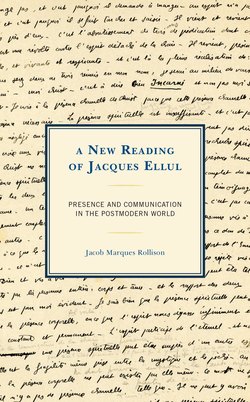Читать книгу A New Reading of Jacques Ellul - Jacob Marques Rollison - Страница 16
Summary of Argument
ОглавлениеThis book is divided into two sections: architecture and movement. In Apocalypse, Ellul thinks that the only way the book of Revelation can be understood is through a global understanding of the book’s symbolism in its overall biblical context, combined with a look at what the movement of the book does with this symbolism—i.e., the book’s symbolic architecture and its movement.[69] I emulate this in my reading of Ellul, arguing that presence allows us to see both the architecture and movement of his theological ethics. “Architecture” describes constitutive elements of Ellul’s thought necessary to comprehend the study of Ellul’s historical evolution in “Movement”: grasping the movement presupposes a study of the structure. It is helpful to note that “Architecture” treats presence indirectly, laying the groundwork for understanding the term; the fullest discussion of what presence means comes in chapter 3.
Chapter 1 of “Architecture” focuses on Ellul’s 1987 book Reason for Being: Meditations on Ecclesiastes, naming presence as a central theme in this conclusion to Ellul’s corpus. I argue that Reason most clearly displays the epistemological core of Ellul’s theology. Ellul reads Qohelet (Ecclesiastes’ prime narrator) and Kierkegaard through each other, seeing both as ironic anti-philosophical thinkers who wrestle with temporal limits. Kierkegaard’s focus on “contemporaneity with Christ” forms a central element of Ellul’s understanding of time, but Ellul modifies this by reading Kierkegaard through Qohelet. This describes the present time within which presence as an ethical term takes on meaning, showing how this present links time, language, and humanity. This treatment locates the concrete theological source and explanation for the relation of God to the world within which Ellul’s ethics is situated. Further, Ellul’s Qoheletian reading of Kierkegaard modifies Kierkegaard’s irony. While Kierkegaard wrote with an ironic relation between his words and his life, often saying the opposite of what he meant, Ellul’s irony is serious and self-critical. This serious relation to words makes structuralism’s emphasis on the separation of word and speaker so crucially problematic for Ellul.
Chapter 2 of “Architecture” examines the other side of the dialectic, featuring Ellul’s approach to Marx and his institutional studies and tracing Ellul’s sociological account of the destruction of language. Even in Ellul’s sociology, the present links time, language and humanity. Ellul thus has sociological (in addition to theological) reasons to oppose static thought, implying that the sociology-theology ‘dialectic’ in Ellul’s thought is irreducible to either mode of thought. Rather, it is often a matter of discerning whether Ellul makes a given move for primarily sociological or theological reasons. Further, societal institutions are a present work of God in Christ, linked to language; propaganda and the societal destruction of language are thus dangers for the communal life of western society.
Chapter 3 (the first of “Movement”) focuses on presence in Ellul’s theological ethics. Ellul’s theology and experience of presence led to a Christian ethics of signification. I demonstrate how presence operated in Ellul’s works before his crisis and interaction with structuralism (which happens around 1965–70) by focusing on Ellul’s major ethical works before these dates. I especially focus on two untreated works: Ellul’s unpublished 1936 article “The Dialogue of Sign and Presence (Notes for a Christianity Learned by Heart),” and the recently published second half of To Will & To Do.[70] Ellul used the word presence to name a mutually-implicating triple dialogue between sign and presence, body and spirit, and time and space. This triple dialogue and the themes in Dialogue recur and give shape to Ellul’s entire ethical corpus.
Chapter 4 treats France’s societal and Ellul’s personal crises in the 1960s. I contextualize the instability of French intellectual life within the rise of new media, a changing university structure, and the rapid rise to prominence of structuralism. The latter is understandable as a Nietzschean critique of presence, implying critiques of the human, history, and language. Ellul’s copy of Michel Foucault’s The Order of Things (1966) is examined, detailing his reactions from his margin notes. I draw out Ellul’s reactions to Foucault and structuralism in his writings from this period, demonstrating sociological critique and intense theological questioning of presence. I then show the beginnings of Ellul’s theological response in his discussion of Christ’s cry, “My God, my God, why have you forsaken me?,” interpreting it as expressing hope and grounding communication which takes presence seriously, even in apparent abandonment.
Chapter 5 uses what has been learned to elucidate two of Ellul’s post-crisis books, L’espérance oubliée (1972) and La parole humiliée (1981), as responses to structuralism. In the former, Ellul recasts his theological ethics with hope as the new mode of presence. If before, Ellul’s theology of presence led to an ethics of signification, at this juncture, his theology of hope as presence leads to a revised and restricted ethic based on Kierkegaard’s communicative incognito. In the new situation, the church will often refuse to speak its faith, but can still indirectly communicate its hope. Humiliation offers a linguistic approach focusing on speech as the fragile and non-violent expression of truth and the best hope for human community, rehabilitating language against structuralist emphases on text or image, critiques of language as violent, and hope for community outside of language. Treating Ellul’s Autopsy of Revolution (1969) and Apocalypse (1975), I draw out Ellul’s critique of Marx and Hegel as inscribing history within a dialectical progression, mechanizing it. This elucidates why Apocalypse constitutes a dramatic shift: Ellul reads Revelation as concerning the work of the eternal in history, but reads Marxist time into the biblical account, explicitly viewing Jesus Christ as the ‘synthesis’ of the work of God and human history. This departure from his earlier view of presence grounds the certainty of his belief in universal salvation.
I conclude by summarizing what this approach offers ethically to our current communicative situation, before reflecting on theological communication in dialogue with 1 Corinthians. Throughout, citations from French texts are my translation unless otherwise noted.
